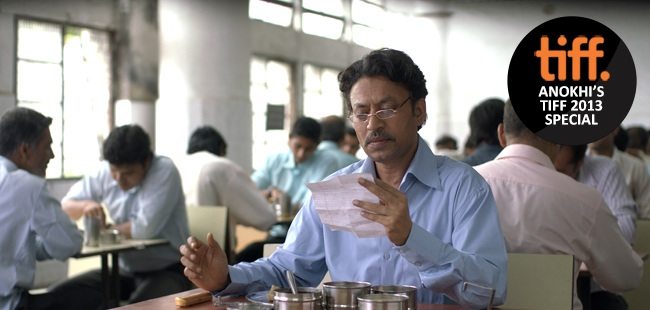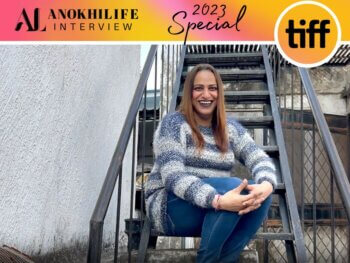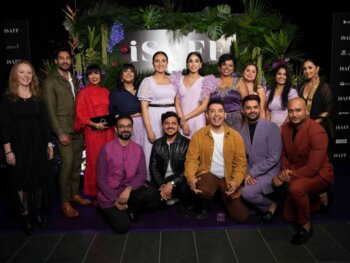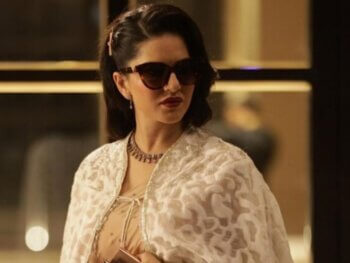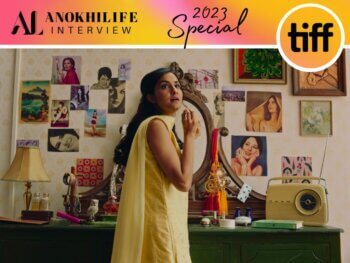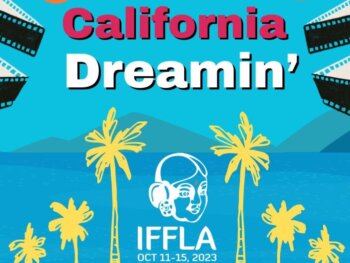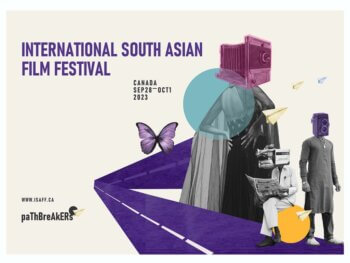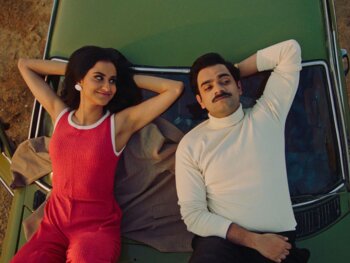After turning heads (and securing International distribution) at Cannes and Telluride, bittersweet romantic drama The Lunchbox has continued earning raves and melting hearts at TIFF 2013. It centres on the slow-blossoming relationship between a widowed factory worker (Irrfan Khan) and a lonely housewife (Nimrat Kaur) in Bombay who begin exchanging letters after a serendipitous case of mistaken lunchbox.
Recently, I caught up with the film’s director, Ritesh Batra, to discuss the unconventional romance at The Lunchbox’s core, the deeper meaning behind the film’s delectable array of dishes, and why movies are tools for survival.

(L-R) Co-Presidents of Sony Pictures Classics Michael Barker and Tom Bernard, producer Guneet Monga (front), actor Irrfan Khan, and director Ritesh Batra arrive at the "The Lunchbox" Premiere during the 2013 Toronto International Film Festival at Roy Thomson Hall on September 8, 2013 in Toronto, Canada./Photographer:Jag Gundu/Getty Images
When did you come up with the idea for The Lunchbox?
The genesis of the project was in 2007. I was trying to make a documentary about the dabawallas, the lunchbox delivery men. I embedded myself with them, and they told me these little germs of stories, like “In this house, the mother-in-law rules.” I just became more interested in those people. So I abandoned the documentary and started writing.
How did you decide on letter-writing as the appropriate medium for Ila and Saajan’s relationship?
This was a story about two people who cannot communicate within their worlds, but they can communicate with each other. And then there’s an old-worldliness about the characters.
They’re stuck in a different time, a time when they used to be happy. And so, for all this old-worldliness, the only way it made sense for them to communicate was through these letters.

Irrfan Khan (Saajan) & Nawazuddin Siddiqui (Shaikh) in the movie 'The Lunchbox'/Tiff.net
One thing that’s drawn a lot of attention is all the stunning meals Ila prepares. How does food relate to the film’s deeper meaning?
Like in life, when we have the real problem and we don’t see it, we try to lose ourself in some mundane detail. I thought that cooking is a great way for her to not see the real problems in her life and try to fix them by cooking. Ironically, it connects her to Saajan.
What changed between your original concept of the film and what ultimately ended up onscreen?
Shaikh’s character [an office mate of Saajan’s, played by Nawazuddin Siddiqui], he was not there in my first draft, and it always felt like something was missing.
Because he’s an optimist and he’s adaptable and he’s everything that the other characters are not. He sort of became the stand-in for Bombay in the story; as I kept writing and he emerged and emerged, the city started receding.
I grew up in Bombay, and it was interesting to write a character that represents Bombay.
This has been called a feel-good film. Do you feel like that term encapsulates what The Lunchbox is?
Yes and no. The idea is that people will watch this film and bring themselves to it. For some people who’ve watched it, it’s an ode to loneliness. I’ve read that it’s a feel-good film, it’s a romantic comedy, it’s a drama. That’s very interesting to me, that everyone brings themselves to the film.
What would you like people to get out of The Lunchbox?
You really want people to bring their lives to the movie; that’s why we ended it [on an ambiguous note]. There is a lot of things these characters have been through before the film even begins, and the film is about how they deal with that baggage.
For us, it was always about less is more — in the acting style in the film, in the way we want to shoot it, we wanted to be simple, but not simplistic… so I think, if you can do that, audiences maybe think about the baggage of their own lives.
Films really help us survive. I see [movies] as a big crutch in my life, so I hope that my film is a crutch to some small degree, as well.
Video courtesy:Sony Classics/Cannes
Matthew Currie
Author
A long-standing entertainment journalist, Currie is a graduate of the Professional Writing program at Toronto’s York University. He has spent the past number of years working as a freelancer for ANOKHI and for diverse publications such as Sharp, TV Week, CAA’s Westworld and BC Business. Currie ...


















































